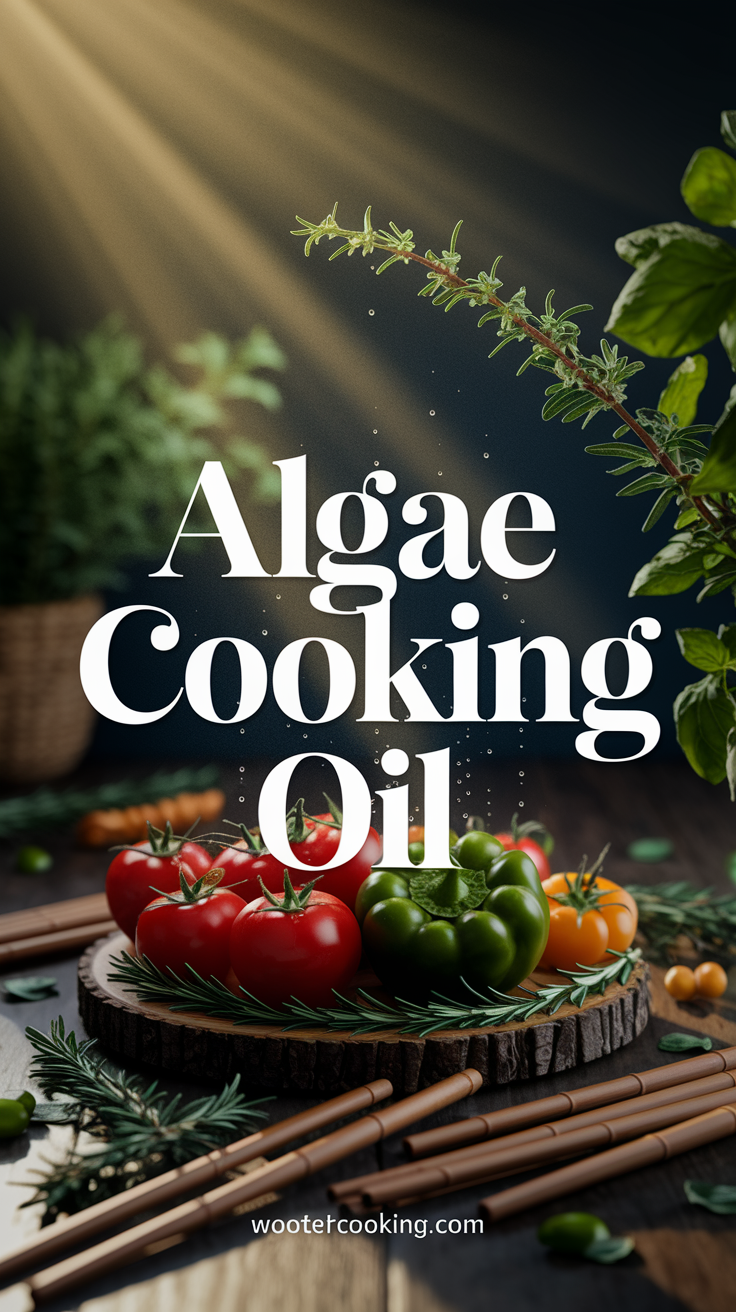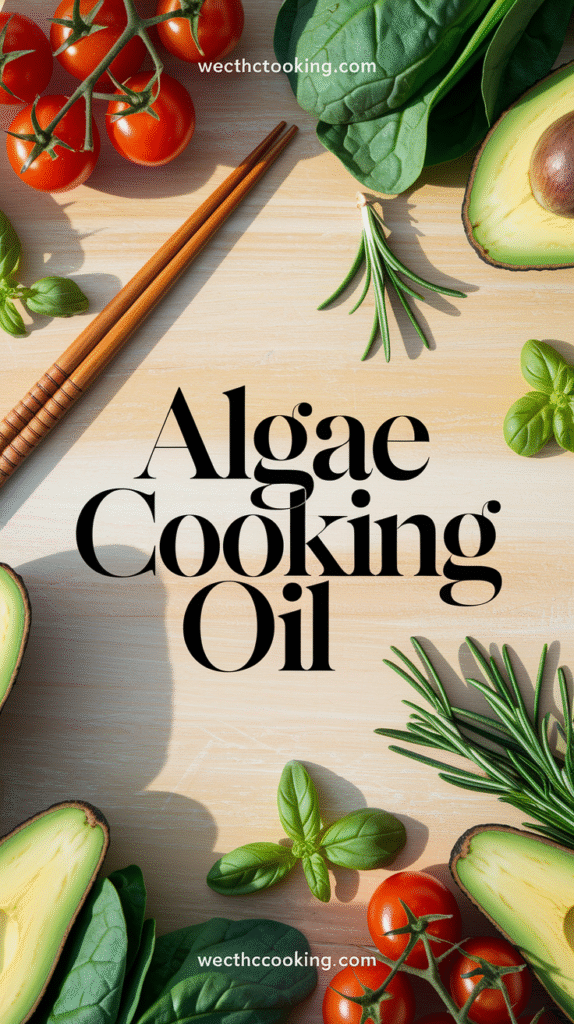In recent years, the culinary world has been delving deeper into unconventional oils as healthy alternatives for cooking and frying. One of the standout contenders in this category is algae cooking oil. Bursting with nutritional benefits and sustainable properties, algae oil is quickly making its mark in modern cuisine.
Algae cooking oil is derived from various species of algae, which are aquatic plants rich in omega-3 fatty acids and antioxidants. This type of oil is not only beneficial for your health but also for the environment, making it a favored choice among health-conscious consumers and eco-friendly chefs.
Health Benefits of Algae Cooking Oil
When you choose algae cooking oil, you are opting for a blend of health benefits that can enhance your meals. Here’s a closer look at some of those benefits:
- Rich in Omega-3 Fatty Acids: Algae oil boasts high levels of DHA (docosahexaenoic acid), a crucial omega-3 fatty acid known for its heart and brain health benefits. These fatty acids can aid in lowering cholesterol and promoting overall cardiovascular health.
- Antioxidant Properties: The oil contains antioxidants, which can help combat oxidative stress and inflammation in the body. This can contribute to better immune function and overall health.
- Low in Saturated Fat: Unlike many other cooking oils, algae oil is low in saturated fat, making it a healthier option for cooking, frying, and dressing salads.
- Vegan Source of Omega-3: For those on plant-based diets, algae oil is a superb vegan source of omega-3 fatty acids, providing an alternative to fish oil supplements.
Sustainability Factor
Algae cooking oil also plays a crucial role in sustainability. Here’s why:
- Low Resource Requirement: Algae can be cultivated in a variety of environments, including saltwater and non-arable land, which means it does not compete with traditional crops for agricultural resources.
- Less Water Use: Algae farming requires significantly less water than traditional crops. This makes it an efficient choice for sustainable food production.
- Carbon Capture: Algae absorb carbon dioxide, helping to reduce greenhouse gases in the atmosphere. By choosing algae oil, you are supporting a product that actively contributes to combating climate change.
Versatility in Cooking
Algae cooking oil is incredibly versatile, making it suitable for various culinary uses. You can use it in:
- Frying: Due to its high smoke point, it’s great for frying foods without changing their flavor.
- Baking: Use it in baked goods for moistness and nutrition without the overpowering taste of some oils.
- Dressing: Create delicious dressings and marinades that pack a nutritious punch.
- Sautéing: It’s excellent for sautéing vegetables while leaving them with a delicate flavor.
Flavor Profile
One of the great advantages of algae cooking oil is its mild flavor. Unlike other oils that can dominate a dish, algae oil complements the natural flavors of the ingredients. This makes it perfect for any kitchen, allowing you to create healthy meals without sacrificing taste.
How to Incorporate Algae Cooking Oil into Your Diet
Here are simple ways to add algae oil to your meals:
| Dish Type | Usage Example |
|---|---|
| Salads | Use as a base for your vinaigrette. |
| Stir-fry | Heat it for sautéing a variety of vegetables. |
| Baked goods | Substitute for butter or other oils in recipes. |
| Popcorn | Drizzle on freshly popped popcorn for flavor. |
Furthermore, nutrition-savvy individuals might consider using Algaecal to explore the health benefits of algae and its applications in cooking. For more detailed information about healthy cooking oils, you can visit Eat Right.
As trends continue to shift towards more sustainable and nutritious food options, algae cooking oil stands out as a beacon of innovation in the culinary landscape. By incorporating it into your cooking repertoire, you’re making a choice that not only nourishes your body but also supports a healthier planet.
How Algae Cooking Oil Compares to Traditional Cooking Oils
Cooking oils are a staple in kitchens around the world, and with the rise of health-conscious consumers, new alternatives are becoming popular. One such alternative is algae cooking oil. This trendy ingredient boasts several benefits when compared to traditional cooking oils like canola, olive, and coconut oil. Understanding the differences between algae oil and conventional options can help you make informed cooking choices for your health and culinary adventures.
Algae cooking oil is derived from algae, a plant that grows in water. In contrast, traditional oils typically come from oilseeds or fruits. Below is a comparison of algae oil and traditional oils in essential areas:
| Property | Algae Cooking Oil | Traditional Cooking Oils |
|---|---|---|
| Nutritional Value | Rich in Omega-3 fatty acids, antioxidants, and vitamins. | Varies; olive oil is high in monounsaturated fats, while palm oil has less nutritional value. |
| Smoke Point | High smoke point (around 485°F / 252°C), suitable for frying. | Varies widely; olive oil has a lower smoke point (around 375°F / 190°C). |
| Flavor Profile | Light and neutral flavor, does not overpower dishes. | Distinct flavors; olive oil is fruity, coconut oil is sweet. |
| Sustainability | Environmentally friendly; produced with less land and water. | Varies; some oils like palm oil are linked to deforestation. |
One of the standout benefits of algae cooking oil is its nutritional profile. It contains an impressive amount of Omega-3 fatty acids, which are essential for heart and brain health. Unlike many traditional oils that lack this vital nutrient, algae oil helps add healthy fats to your diet.
The smoke point of a cooking oil is critical for frying and sautéing. Algae oil has a high smoke point, making it an excellent choice for various cooking methods, including baking, frying, and grilling. Conversely, some traditional oils, such as extra virgin olive oil, have a lower smoke point and can degrade when heated too high, losing their beneficial properties.
When it comes to flavor profile, algae oil excels in its neutrality. Its mild taste allows it to blend seamlessly into a variety of dishes without altering their original flavors. This can be an advantage if you are preparing delicate recipes or want to let the primary flavors shine through. Traditional oils often bring their own unique flavors, which may not always complement every dish.
Sustainability is another area where algae oil has a significant edge. The production of algae oil requires much less land and water compared to crops like soybeans or palm oil. This means that embracing algae oil can lead to a smaller environmental footprint, making it an appealing choice for eco-conscious consumers. Traditional oils can have a more negative impact on ecosystems, especially those linked to deforestation.
However, while algae cooking oil offers numerous advantages, it is essential to consider your cooking needs and preferences. There are still valid reasons to use traditional oils, such as flavor preferences and cooking techniques that work well with those oils. Each type of oil has its place in your kitchen, so mixing and matching might be the best approach for holistic cooking.
While traditional cooking oils have been staples for generations, algae cooking oil is emerging as a strong competitor that provides various health and environmental benefits. It offers a blend of nutritional richness, high smoke point versatility, and sustainability. As the culinary world continues to evolve, incorporating alternative oils like algae could enrich not just your health but your cooking skills as well.
If you want to explore more about algae cooking oil and its benefits, check out resources like AlgaeCal or ScienceDirect.
The Environmental Impact of Using Algae Cooking Oil
Algae cooking oil is becoming popular not only for its culinary uses but also for its potential impact on the environment. With increasing awareness of climate change and sustainability, more people are searching for eco-friendly alternatives to traditional cooking oils. Here, we dive into how algae cooking oil affects the environment positively and its potential as a sustainable resource.
What Makes Algae Cooking Oil Unique?
Algae are tiny organisms that grow in water, and they can produce oils that are rich in omega-3 fatty acids. This unique characteristic makes algae cooking oil a highly nutritious option for cooking and baking. Here are some notable qualities:
- High in essential fatty acids.
- Rich in antioxidants.
- Can be produced sustainably with minimal environmental footprint.
The Production Process
The cultivation of algae for oil extraction requires less land and water compared to conventional crops like soybeans or palm. Algae farms can be set up in places unsuitable for agriculture, such as arid regions or even near coasts. The process generally follows these steps:
- Seed Preparation: Select specific strains of algae that have high oil content.
- Cultivation: Grow algae in controlled environments, utilizing light and nutrients.
- Harvesting: Collect the algae once it reaches peak oil production.
- Oil Extraction: Use mechanical or chemical methods to extract oil.
This efficient production process helps reduce the carbon footprint associated with growing traditional crops.
Environmental Benefits
Choosing algae cooking oil over conventional oils has multiple environmental advantages:
| Aspect | Algae Oil | Traditional Oils (e.g., Soy, Palm) |
|---|---|---|
| Land Use | Minimal | High |
| Water Use | Low (<1% of traditional) | High |
| Greenhouse Gas Emissions | Significantly Lower | Higher |
| Biodiversity Impact | Low | High |
As highlighted in the table, algae oil uses far less land and water compared to traditional oils. Furthermore, it emits lower levels of greenhouse gases during production. This makes it a major player in reducing the environmental impact of cooking oils.
Challenges and Considerations
Despite its benefits, the production of algae cooking oil is not without challenges:
- Scaling Up Production: Currently, large-scale production systems are still under development.
- Cost: Algae oil can be more expensive to produce compared to conventional oils.
- Market Acceptance: Many consumers are still unaware of the benefits and uses of algae cooking oil.
To overcome these challenges, ongoing research and development are necessary in the realms of cultivation methods and extraction techniques.
How to Incorporate Algae Cooking Oil into Your Diet
Algae cooking oil into your diet can be simple. Here are some ways to do so:
- Use it for sautéing vegetables.
- Incorporate it into salad dressings.
- Utilize it in baking for healthier fat content.
By choosing algae cooking oil, you not only support a healthier lifestyle but also contribute to environmental sustainability.
Further Information
If you want to learn more about the impact of algae cooking oil, consider visiting:
- Science Direct – In-depth studies on algae oil benefits.
- NCBI – Research on the health benefits of algae oils.
Algae cooking oil presents a sustainable alternative to traditional cooking oils with numerous environmental benefits. As demand rises for healthier and more eco-friendly options, algae cooking oil is well on its way to making a significant impact in both the culinary world and our efforts to protect the planet.
Innovative Recipes Featuring Algae Cooking Oil
Algae cooking oil is an innovative ingredient that is gaining popularity in kitchens around the world. Not only is it a great source of healthy fats, but it also brings unique flavors that can enhance various dishes. If you’re looking to incorporate algae oil into your cooking repertoire, here are some inventive recipes that will inspire you to experiment.
Delicious Salad Dressings
Dressings made with algae cooking oil offer a nutty flavor that pairs wonderfully with fresh greens. Here are a few ideas:
- Classic Vinaigrette: Whisk together 1/4 cup of algae oil, 1/4 cup of vinegar (balsamic or apple cider), a teaspoon of mustard, salt, and pepper to taste. Drizzle over mixed greens for a refreshing salad.
- Garlic-Lemon Dressing: Blend 1/4 cup of algae oil with the juice of one lemon, a clove of minced garlic, and a pinch of salt. This dressing is perfect for Mediterranean salads.
- Honey-Mustard Dressing: Mix 1/4 cup of algae oil, 2 tablespoons of honey, 2 tablespoons of Dijon mustard, and a splash of vinegar. This flavor-packed dressing complements roasted veggies and greens.
Hearty Soups and Stews
Algae oil can enhance soups by adding richness without overpowering other flavors. Here’s how to use it:
- Vegetable Soup: Sauté onions, garlic, and your choice of vegetables in 2 tablespoons of algae cooking oil. Add vegetable broth, seasonings, and simmer until everything is tender.
- Chili: Use algae oil for frying ground meat or sautéing your veggies in chili recipes. It will add depth to the dish.
- Split Pea Soup: Cook split peas with diced carrots, celery, and spices in broth, using algae oil to sauté the vegetables first.
Unique Baking Opportunities
Algae cooking oil also works well in baking. It can replace traditional fats and butter, making your baked goods healthier:
- Algae Oil Cookies: Replace butter with algae oil in your favorite cookie recipe for a healthier twist. The oil will make your cookies moist and delicious.
- Muffins: Use algae oil in muffin batter instead of vegetable oil. Experiment with flavors like chocolate chip or blueberry to find your favorite.
- Brownies: Include algae oil in brownie mixes for a unique flavor and a moist texture.
Main Dishes That Shine
Create satisfying main courses by incorporating algae cooking oil into your cooking methods:
- Stir-Fried Quinoa: Use algae oil to sauté vegetables and cooked quinoa for a nutritious and filling dish. Toss in your favorite protein for a complete meal.
- Grilled Fish: Marinate fish in algae oil, lemon juice, and spices before grilling. The oil will keep the fish moist while adding a subtle nutty flavor.
- Pasta Primavera: Drizzle cooked pasta with algae oil and toss with seasonal vegetables for a light and delicious meal.
Nutritious Smoothies
For a health boost, consider adding a splash of algae cooking oil to your smoothie:
- Green Smoothie: Blend spinach, banana, almond milk, and a tablespoon of algae oil for a nutritious breakfast.
- Berry Smoothie: Combine mixed berries, yogurt, honey, and a teaspoon of algae oil. The oil will give an extra creamy texture.
Integrating algae cooking oil into your meals not only enhances flavor but also provides essential omega-3 fatty acids that are important for your health. It’s a versatile ingredient that fits well into various recipes. You can explore more about algae oil benefits and cooking tips on websites such as Healthline and Verywell Fit.
Trying out these innovative recipes featuring algae cooking oil might just inspire you to rethink how you use healthy oils in your cooking. Start experimenting today, and you might discover a new favorite dish!
Nutritional Advantages of Cooking with Algae Oil
Cooking with algae oil is gaining popularity due to its impressive nutritional profile and health benefits. Algae oil, derived from algae, is not only versatile but also packed with essential nutrients that can enhance your diet. One of the most significant advantages is its high content of omega-3 fatty acids. Unlike traditional cooking oils, algae oil contains a unique blend of DHA (docosahexaenoic acid) and EPA (eicosapentaenoic acid), both of which are crucial for heart health and brain function. algae oil into your meals is a delightful way to boost your nutrition seamlessly.
Another major benefit of cooking with algae oil is its rich antioxidant properties. Antioxidants are vital for protecting your body from oxidative stress and inflammation. Algae oil is known to contain various compounds that help neutralize free radicals, which can reduce the risk of chronic diseases. By using algae oil in your cooking, you not only flavor your dishes but also enhance their health benefits dramatically.
When it comes to cooking, the smoke point of an oil is essential to consider, as it affects the oil’s stability and nutrient retention. Algae oil has a high smoke point of around 485°F (250°C), making it ideal for various cooking methods, including frying and sautéing. This versatility means you can use it in a wide range of delectable dishes, from stir-fries to baked goods, without compromising its nutritional advantages. This ability to maintain its integrity under high heat is also crucial for ensuring that you reap all the health benefits.
Using algae oil is also a great way to enhance your intake of essential vitamins. For instance, it is rich in vitamin E, an important nutrient that plays a key role in maintaining healthy skin and eyes. Vitamin E is also known for its antioxidant properties, further complemented by the antioxidants present in algae oil itself. By choosing algae oil as your cooking medium, you can help support your overall health and well-being.
Here are some nutritional benefits of cooking with algae oil:
- High in Omega-3 Fatty Acids: A beneficial alternative to omega-6 rich oils.
- Reducing Inflammation: Contains anti-inflammatory properties that can help with chronic conditions.
- Rich in Antioxidants: Helps fight oxidative stress.
- Excellent Source of Vitamin E: Supports skin health and immune function.
- Heart Health: Promotes cardiovascular health by supporting healthy cholesterol levels.
In addition to its health benefits, algae oil also offers sustainable cooking options. Algae can be cultivated with a smaller ecological footprint than traditional crops, requiring less land and water. This makes it a more environmentally friendly choice, aligning with the growing demand for sustainable food sources. When you choose algae oil, you not only care for your health but also contribute to a more sustainable planet.
Many people wonder how to incorporate algae oil into their recipes. It can easily replace any cooking oil in your kitchen. Simply use it for frying, baking, or as a salad dressing base. Its mild flavor allows you to enjoy your favorite dishes without altering their taste. For those who love experimenting, consider using algae oil in marinades or dipping sauces to add a new dimension of flavor to your meals.
To explore more about the advantages of algae cooking oil, visit FAO Algae Food Safety for insights into handling and utilizing algae in cooking. Another resource you might find helpful is ScienceDirect’s article on the health benefits of algae oil, which gives a scientific perspective on its nutritional values.
The nutritional advantages of cooking with algae oil are abundant. Its rich profile of omega-3 fatty acids, antioxidants, and vitamins not only contribute to your overall health but also make it a versatile cooking ingredient. Transitioning to algae oil is not just a culinary change; it’s a step toward a healthier lifestyle and a more sustainable planet.
Conclusion
As we’ve explored throughout this article, algae cooking oil brings a wealth of benefits to modern cuisine. Not only does it provide a unique flavor profile that can enhance a variety of dishes, but it also stands out when compared to traditional cooking oils. Algae oil is rich in heart-healthy omega-3 fatty acids and offers a higher smoke point, making it suitable for various cooking methods, from sautéing to frying.
On the environmental front, using algae cooking oil presents a positive shift towards sustainable practices. Algae can be cultivated on non-arable land and doesn’t compete with food crops, making it a promising alternative to oil derived from plants that require significant agricultural resources. This shift can play a crucial role in reducing the carbon footprint associated with our cooking habits.
Furthermore, if you’re looking to spice up your culinary repertoire, you’ll find that there are countless innovative recipes to explore with algae oil. From delicious salad dressings to rich marinades and even baked goods, the versatility of this oil is impressive. Its nutritional advantages, combined with its environmental benefits, make it a compelling choice for health-conscious eaters.
Algae cooking oil into your meals not only boosts your health but also supports a more sustainable food system. By embracing this modern ingredient, you can enjoy tasty recipes while contributing positively to the planet. Make the switch today and discover the myriad ways that algae cooking oil can enhance your kitchen adventures.







